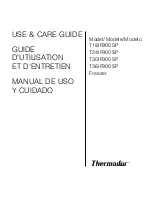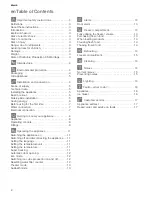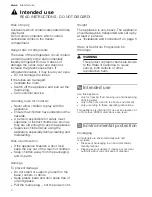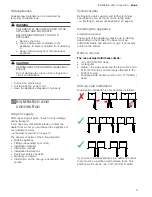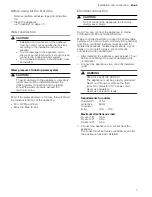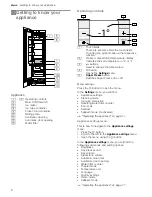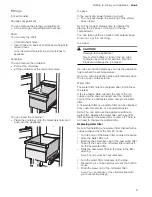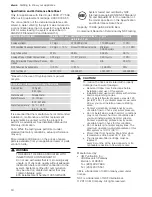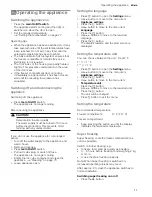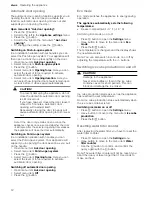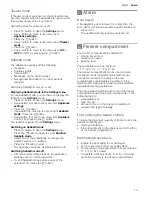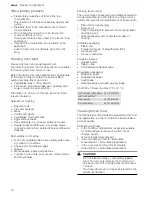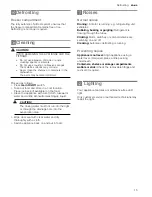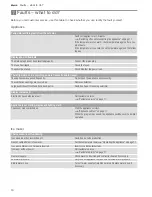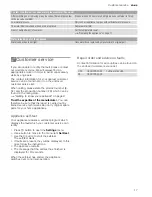
en-us
Freezer compartment
14
When loading products
■
Freeze large quantities of food in the top
compartment.
This is where it will freeze especially quickly and
gently.
■
Distribute food in the compartments or frozen
food containers.
■
Do not bring food which is to be frozen into
contact with frozen food.
If required, restack frozen food in the frozen food
containers.
■
Important for unrestricted air circulation in the
appliance:
push in frozen food containers up to the limit
stop.
Freezing fresh food
Freeze only fresh and undamaged food.
Food which is boiled, fried or baked is more suitable
for freezing than food which is raw.
Before freezing food, make preparations appropriate
to the food in order to retain the best possible
nutritional value, flavor and color:
■
Vegetables: wash, chop, blanch.
■
Fruit: wash, pit and perhaps peel, possibly add
sugar or ascorbic acid solution.
Information on how to do this can be found in the
relevant literature.
Suitable for freezing
■
Baked goods
■
Fish and seafood
■
Meat
■
Poultry and game
■
Vegetables, fruit and herbs
■
Eggs without shells
■
Dairy products, e.g. cheese, butter and quark
■
Ready meals and leftovers, e.g. soups, stews,
cooked meat and fish, potato dishes, soufflés and
desserts
Not suitable for freezing
■
Types of vegetables which are usually eaten raw,
e.g. lettuce or radishes
■
Unpeeled or hard-boiled eggs
■
Grapes
■
Whole apples, pears and peaches
■
Yoghurt, soured milk, sour cream, creme fraiche
and mayonnaise
Packing frozen food
The correct type of packaging and material selection
are decisive factors in the retention of the product
quality and prevent the development of freezer burn.
1.
Place food in packaging.
2.
Remove air.
3.
Pack food airtight to prevent it from losing flavor
and drying out.
4.
Label packaging with contents and date of
freezing.
Suitable packaging:
■
Plastic foil
■
Tubular foil made of polyethylene (PE)
■
Aluminum foil
■
Freezer containers
Suitable closures:
■
Rubber bands
■
Plastic clips
■
Cold-resistant adhesive tape
Unsuitable packaging:
■
Wrapping paper
■
Greaseproof paper
■
Cellophane
■
Garbage bags and used grocery bags
Shelf life of frozen food at 0 °F (-18 °C)
Thawing frozen food
The defrosting method must be adjusted to the food
and application in order to retain the best possible
product quality.
Defrosting methods:
■
in the cooling compartment (especially suitable
for animal-based foods such as fish, meat,
cheese, quark)
■
at room temperature (bread)
■
in the microwave (food for immediate
consumption or immediate preparation)
■
in the oven/cooker (food for immediate
consumption or immediate preparation)
9
CAUTION!
Do not refreeze partly or completely thawed
food. You can only refreeze the food when it
has been used for a ready-to-eat meal (boiled
or fried).
The frozen food can no longer be stored for the
maximum duration.
Fish, sausage, ready meals,
cakes and pastries:
up to 6 months
Meat, poultry:
up to 8 months
Fruit, vegetables:
up to 12 months

